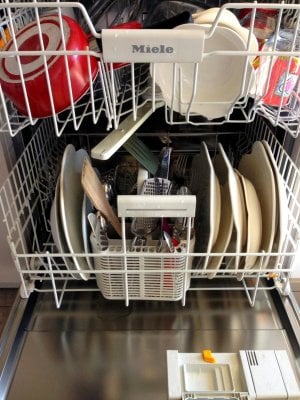Experts unveil the ultimate dishwasher loading strategy that will transform your kitchen routine
You've seen the arguments over it at family gatherings and perhaps even within your own home: How do you load a dishwasher properly?
You might think it's a simple and straightforward question, but the dish-loading debacle has divided households and stirred sentiments.
Now, experts have weighed in on the matter, answering the burning questions: Should there be a specific gap between dishes? Which way do the spoons go? Is pre-rinsing necessary?
Let's face it, loading a dishwasher can be challenging. The ultimate goal is to fit in as many items as possible while ensuring all are cleaned thoroughly.
Sophie Lane, Product Training Manager at the appliance maker Miele, suggested that there is an 'art' to loading a dishwasher.
A well-executed loaded dishwasher maximises the machine's efficiency and gets your dishes gleaming.
To achieve this, ensure your items aren't touching each other and maintain a gap of approximately 2 cm between them.
Why this arrangement? The angling allows the water jets to reach each dish effectively without any hindrance.
Smaller items are especially at risk of being missed, so they should be properly secured and spaced out.
As for cutlery, the 'together-forever' drill doesn't work. Bundling spoons or forks can compromise cleanliness, with only the outermost front and back surfaces getting a proper clean.
Thus, it is recommended to avoid clustering cutlery together.
To resolve this issue, most dishwasher experts recommend stacking cutlery in a tray rather than a basket, facilitating an effective cleaning process.
Furthermore, a cutlery tray, typically located at the top of the dishwasher, bypasses the dilemma of whether to place your knives and forks facing upwards for a thorough clean or downwards to minimise injury risk.
Now, moving on to an age-old question: Should we pre-rinse dishes? Lane argued that pre-rinsing dishes is a waste of time and water.
'The dishwasher is there to do that,' she said.
It is also recommended to spin the rotating arm before turning on the dishwasher to ensure that there are no blockages.
In 2015, Dr Raul Pérez-Mohedano from the University of Birmingham conducted a study on the best way to load a dishwasher.
He concluded that packing items in a circle around the cutlery basket was the most efficient. However, after studying numerous cycles, experts warned that current basket designs may make implementation of their findings difficult.
Fascinatingly, the study also suggested arranging dishes according to stain types. Carbohydrate-based stains like potato and tomato benefiting from water jet force, whereas protein-based foods (think dried egg yolk) require more contact with the detergent.
During a study, engineers used radioactive isotopes to monitor the speed and direction of the water jets when the dishwasher was in use.
They discovered that although the entire interior of the dishwasher gets wet during a cycle, it doesn't necessarily clean everything evenly.
Thus, strategic dish placement is crucial to optimise its cleaning performance.
 Do you have any more tips on how to load your dishwasher? Share them in the comments below.
Do you have any more tips on how to load your dishwasher? Share them in the comments below.
You might think it's a simple and straightforward question, but the dish-loading debacle has divided households and stirred sentiments.
Now, experts have weighed in on the matter, answering the burning questions: Should there be a specific gap between dishes? Which way do the spoons go? Is pre-rinsing necessary?
Let's face it, loading a dishwasher can be challenging. The ultimate goal is to fit in as many items as possible while ensuring all are cleaned thoroughly.
Sophie Lane, Product Training Manager at the appliance maker Miele, suggested that there is an 'art' to loading a dishwasher.
A well-executed loaded dishwasher maximises the machine's efficiency and gets your dishes gleaming.
To achieve this, ensure your items aren't touching each other and maintain a gap of approximately 2 cm between them.
Why this arrangement? The angling allows the water jets to reach each dish effectively without any hindrance.
Smaller items are especially at risk of being missed, so they should be properly secured and spaced out.
As for cutlery, the 'together-forever' drill doesn't work. Bundling spoons or forks can compromise cleanliness, with only the outermost front and back surfaces getting a proper clean.
Thus, it is recommended to avoid clustering cutlery together.
To resolve this issue, most dishwasher experts recommend stacking cutlery in a tray rather than a basket, facilitating an effective cleaning process.
Furthermore, a cutlery tray, typically located at the top of the dishwasher, bypasses the dilemma of whether to place your knives and forks facing upwards for a thorough clean or downwards to minimise injury risk.
Now, moving on to an age-old question: Should we pre-rinse dishes? Lane argued that pre-rinsing dishes is a waste of time and water.
'The dishwasher is there to do that,' she said.
It is also recommended to spin the rotating arm before turning on the dishwasher to ensure that there are no blockages.
In 2015, Dr Raul Pérez-Mohedano from the University of Birmingham conducted a study on the best way to load a dishwasher.
He concluded that packing items in a circle around the cutlery basket was the most efficient. However, after studying numerous cycles, experts warned that current basket designs may make implementation of their findings difficult.
Fascinatingly, the study also suggested arranging dishes according to stain types. Carbohydrate-based stains like potato and tomato benefiting from water jet force, whereas protein-based foods (think dried egg yolk) require more contact with the detergent.
During a study, engineers used radioactive isotopes to monitor the speed and direction of the water jets when the dishwasher was in use.
They discovered that although the entire interior of the dishwasher gets wet during a cycle, it doesn't necessarily clean everything evenly.
Thus, strategic dish placement is crucial to optimise its cleaning performance.
Key Takeaways
- Experts have provided guidance on the best techniques for loading a dishwasher, including plate spacing and cutlery arrangement.
- Pre-rinsing dishes before loading them into the dishwasher is generally considered a waste of time and water.
- Cutlery should be spaced out, ideally in a cutlery tray rather than a basket, to ensure a thorough cleaning.
- A 2015 University of Birmingham study used radioactive isotopes to monitor water jets in dishwashers, advising on how to pack dishes based on the type of stain they have.








